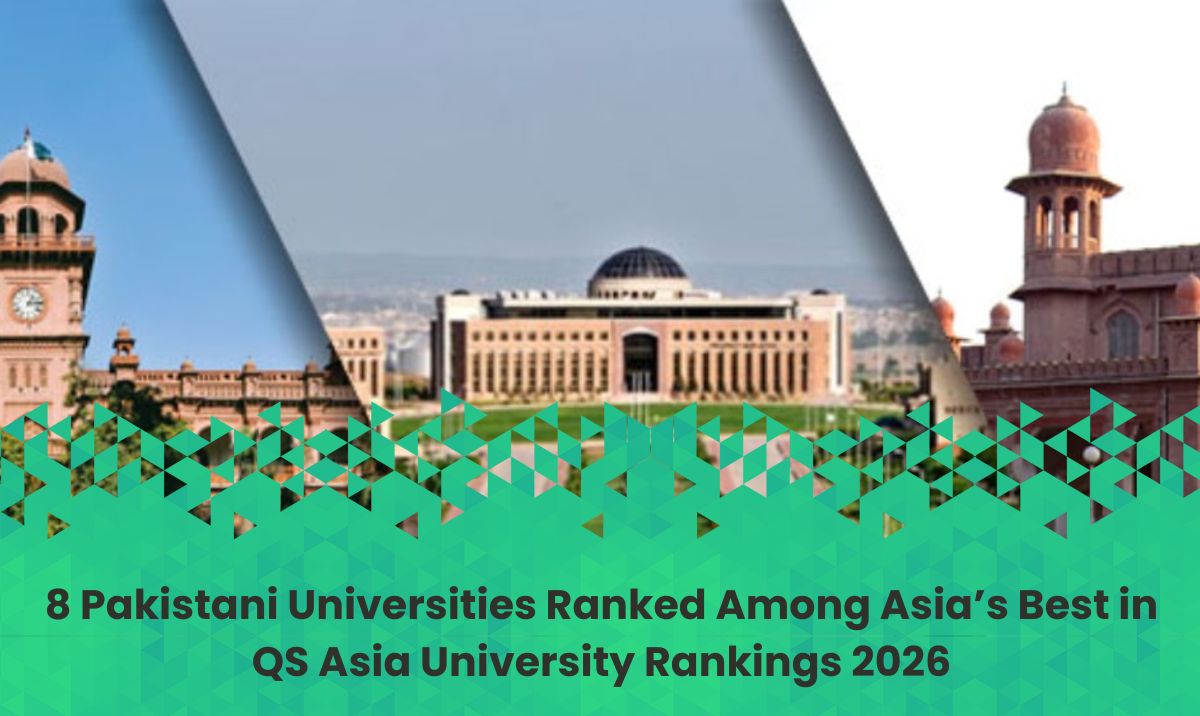
8 Pakistani Universities Declared Among Asia’s Best in QS Asia University Rankings 2026
Pakistan continues to make its mark on the global higher education map, with eight universities securing places in the QS World University Rankings: Asia 2026. The prestigious ranking, compiled by Quacquarelli Symonds (QS), evaluates the performance of Asian universities based on academic excellence, research impact, global reputation, and internationalization.
Pakistan’s Top-Performing Universities in Asia 2026
Leading the Pakistani institutions this year is the Pakistan Institute of Engineering and Applied Sciences (PIEAS), which has achieved a remarkable rank of 238. Known for its focus on research and advanced scientific education, PIEAS maintains its reputation as the country’s premier institution for engineering and applied sciences.
Following PIEAS is Air University, Islamabad, ranked 328th, which has shown consistent improvement in recent years due to its strong emphasis on technology, innovation, and applied research. The third spot among Pakistani institutions goes to Bahria University, Karachi, which has secured a rank of 416, reflecting its progress in research collaborations and academic quality.
The full list of Pakistani universities that made it to the QS Asia University Rankings 2026 is as follows:
| S. No. | University | City | Rank |
|---|---|---|---|
| 1 | Pakistan Institute of Engineering and Applied Sciences (PIEAS) | Islamabad | 238 |
| 2 | Air University | Islamabad | 328 |
| 3 | Bahria University | Karachi | 416 |
| 4 | The Islamia University of Bahawalpur | Bahawalpur | 434 |
| 5 | University of Veterinary and Animal Sciences | Pattoki | 607 |
| 6 | Hazara University | Mansehra | 614 |
| 7 | University of Swat | Mingora | 761-770 |
| 8 | University of Sahiwal | Sahiwal | 951-1000 |
This recognition highlights the growing prominence of Pakistani universities in regional rankings and underscores their commitment to academic development, research innovation, and international collaboration.
PIEAS Leads Pakistan Once Again
PIEAS has long been recognized as one of Pakistan’s leading institutions in the fields of engineering, science, and technology. Its performance in the 2026 rankings reflects the university’s dedication to high-quality research output, well-qualified faculty, and a robust academic structure. The university’s consistent top position among Pakistani institutions emphasizes its critical role in advancing scientific education and contributing to national development.
Rising Performers: Air University and Bahria University
Air University continues to strengthen its reputation as one of Pakistan’s top emerging universities. With modern programs in computer science, engineering, and management, Air University’s inclusion among the top 350 Asian universities demonstrates its academic excellence and international engagement.
Bahria University, on the other hand, has gained recognition for its expanding research network and quality education in diverse disciplines, including business, computer sciences, and health sciences. Its steady rise in the rankings mirrors its commitment to innovation and global competitiveness.
Regional Representation and Academic Diversity
One of the most promising aspects of this year’s rankings is the geographical diversity among the Pakistani universities that made the list. Institutions from Bahawalpur, Pattoki, Mansehra, Mingora, and Sahiwal have earned spots, proving that quality higher education is expanding beyond major cities like Islamabad, Lahore, and Karachi.
The inclusion of universities such as the University of Veterinary and Animal Sciences (Pattoki), Hazara University (Mansehra), University of Swat, and University of Sahiwal reflects the growing academic standards in regional areas and the government’s continued efforts to promote higher education across Pakistan.
Methodology Behind QS Asia Rankings
The QS Asia University Rankings, first introduced in 2009, are based on a comprehensive methodology that evaluates institutions on multiple performance indicators. The 2026 edition assessed universities using the following key metrics:
-
Academic Reputation
-
Employer Reputation
-
Faculty/Student Ratio
-
International Research Network
-
Citations per Paper
-
Papers per Faculty
-
Staff with a PhD
-
Proportion of International Faculty
-
Proportion of International Students
-
Inbound and Outbound Exchange Students
These factors collectively determine each institution’s standing, balancing academic strength, employability outcomes, and research impact.
.jpg)
Global Comparison: Top 10 Universities in Asia 2026
While Pakistani universities continue to strengthen their positions, the top spots in the QS Asia University Rankings 2026 were dominated by institutions from Hong Kong, China, and Singapore.
| Serial Number | University Name | City | Country | Rank |
|---|---|---|---|---|
| 1 | The University of Hong Kong | Hong Kong | Hong Kong | 1 |
| 2 | Peking University | Beijing | China | 2 |
| 3 | Nanyang Technological University (NTU Singapore) | Singapore | Singapore | 3 |
| 3 | National University of Singapore (NUS) | Singapore | Singapore | 3 |
| 5 | Fudan University | Shanghai | China | 5 |
| 6 | The Hong Kong University of Science and Technology | Hong Kong | Hong Kong | 6 |
| 7 | City University of Hong Kong (CityUHK) | Kowloon | Hong Kong | 7 |
| 7 | The Chinese University of Hong Kong (CUHK) | Hong Kong | Hong Kong | 7 |
| 9 | Tsinghua University | Beijing | China | 9 |
| 10 | The Hong Kong Polytechnic University | Hong Kong | Hong Kong | 10 |
Significance for Pakistan’s Higher Education Sector
The inclusion of eight Pakistani universities in the QS Asia 2026 rankings marks a positive step for the nation’s education system. It demonstrates progress in research capacity, faculty qualifications, and international collaborations.
Experts believe that continued investment in research infrastructure, academic staff development, and international partnerships can further enhance Pakistan’s global standing. Encouragingly, institutions from smaller cities are now beginning to appear in international rankings, signaling a broader transformation across the higher education landscape.
Pakistan’s presence in the QS Asia University Rankings 2026 is a reflection of the country’s growing academic potential and commitment to excellence in higher education. With PIEAS, Air University, and Bahria University leading the charge, and several regional universities following closely, the nation’s universities are gradually carving out a strong identity in the Asian academic arena.
As Pakistan continues to prioritize education and research, the coming years could see even more universities joining these prestigious global rankings — a testament to the country’s dedication to academic growth and innovation.















